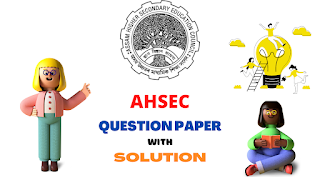AHSEC| CLASS 12| POLITICAL SCIENCE| QUESTION PAPER - 2012| H.S. 2ND YEAR
2012
POLITICAL SCIENCE
Time: 3 hours
The figures in the margin indicate full
marks for the questions
(GROUP – A)
(For New Course)
PART – A
Contemporary World Politics
1. Answer the following: 1x6=6
a) When did Cold War begin?
b) How many members signed in UN Charter when it was
set up?
c) Write the full form of SAARC.
d) When did India start its economic reform?
e) Who was the leader of Communist Revolution in China?
f) Which event does ‘9/11’ refer to in the context of
contemporary world politics?
2. Write the names of permanent members of UN
Security Council. 2
3. What are the causes of globalization? 2
4. Name the two places where atom bombs were dropped
in the Second World War. 2
5. Mention two reforms which President Gorbachev
initiated in the USSR. 2
6. Environmental issues have become a matter of
serious concern in global politics. Why? 2
7. Bangladesh was a part of Pakistan from _____
to ______. (Fill in the blanks) 2
8. Discuss the role of Non-Aligned Movement (NAM)
during the Cold War era. 4
9. What are the four components of traditional
notion of security from external threats? Give examples. 4
10. Briefly discuss about the consequences of
disintegration of the USSR. 4
11. What is meant by ‘Global Commons’? Suggest two
steps for protection of ‘Global Commons’. 1+3=4
12. In which year the World Bank was created?
Discuss its activities. 1+3=4
13. What are different types of hegemony? Give
examples of each of them. 3+3=6
Or
Discuss the role and limitation of SAARC as a forum of regional cooperation. 4+2=6
14. Write a note on
India-China relations. 6
Or
What changes occurred in United Nations
Organization (UNO) after the Cold War? 6
PART – B
Politics in India since Independence
15.
Answer the following: 1x6=6
(a) In India,
which decade was labeled as the ‘dangerous decade’?
(b) Name the
leader of Narmada Bachao Andolan.
(c) Which party
led the National Democratic Alliance (NDA)?
(d) When did the
first Five Year Plan Start?
(Choose
the correct answer)
i. 1961
ii. 1965
iii. 1951
iv. 1975
(e) Name the
Indian President who proclaimed Emergency in 1975.
(f) Name the two
cities which became divided into ‘Communal Zones’ at the time of partition.
16. What was Bombay
Plan? 2
17. Who introduced
twenty point programme and why? 1+1=2
18. When and why
Mandal issue was raised in Indian Politics? 1+1=2
19. What does the
word ‘Political Earthquake’ signifies in Indian Politics? 2
20. Mention two
important basic principles of India’s Foreign Policy. 2
21. On which date
was the draft of the Indian Constitution signed and when it came into
force? 1+1=2
22. Write any four
features of coalition government. 4
23. Discuss briefly
the two challenges that India had to face immediately after independence. 2+2=4
24. What is meant by
Emergency? Write any one effect of the declaration of emergency due to internal
disturbances. 2+2=4
25. Mention any four
regional parties of India. 4
26. Would you
consider the anti-arrack movement as a Women’s movement? Why? 1+3=4
27. Who was the
architect of India’s Foreign Policy? Explain the basic objectives of Jawaharlal
Nehru’s foreign policy. 1+5=6
Or
Explain the Congress dominance in the
first three general elections. 6
28. When was the
Planning Commission set up in India? Discuss its role. 1+5=6
Or
Explain any three main outcome of Lok Sabha election of 1977. 6
***
AHSEC PAGE LINK - CLICK HERE
|
READ HERE SOLVED PAPERS [ARTS, COMMERCE, SCIENCE]
|
|
SUBJECT - [CLASS – 12] |
|
(FULL UPDATE COMING SOON) 1.
EDUCATION: 2014,
2015,
2016,
2017,
2018,
2019,
2022
[PAGE
LINK]
2.
POLITICAL SCIENCE: 2012,
2013,
2014,
2015,
2016,
2017,
2018,
2019,
[PAGE
LINK]
3.
SOCIOLOGY: 2015,
2016,
2017,
2018,
2019,
2020,
2022,
[PAGE
LINK]
4.
LOGIC AND PHILOSOPHY: 2014,
2015,
2016,
2017,
2018,
2019,
[PAGE
LINK]
5. ENGLISH – 2018,
2019,
2020
[PAGE
LINK]
6. ALTERNATIVE ENGLISH – 2022
[PAGE
LINK]
7. MATHEMATICS – 2019,
2022
[PAGE
LINK]
8. BANKING – 2020
[PAGE
LINK]
9. BUSINESS STUDY – 2020
[PAGE
LINK]
10. FINANCE – 2022
[PAGE
LINK]
11.
GEOGRAPHY - (COMING
SOON) 12.
HISTORY - (COMING
SOON) 13.
ECONOMICS - (COMING
SOON) 14.
PHYSICS - (COMING
SOON) 15.
BIOLOGY - (COMING
SOON) 16.
CHEMISTRY - (COMING
SOON) |
Also Read:

